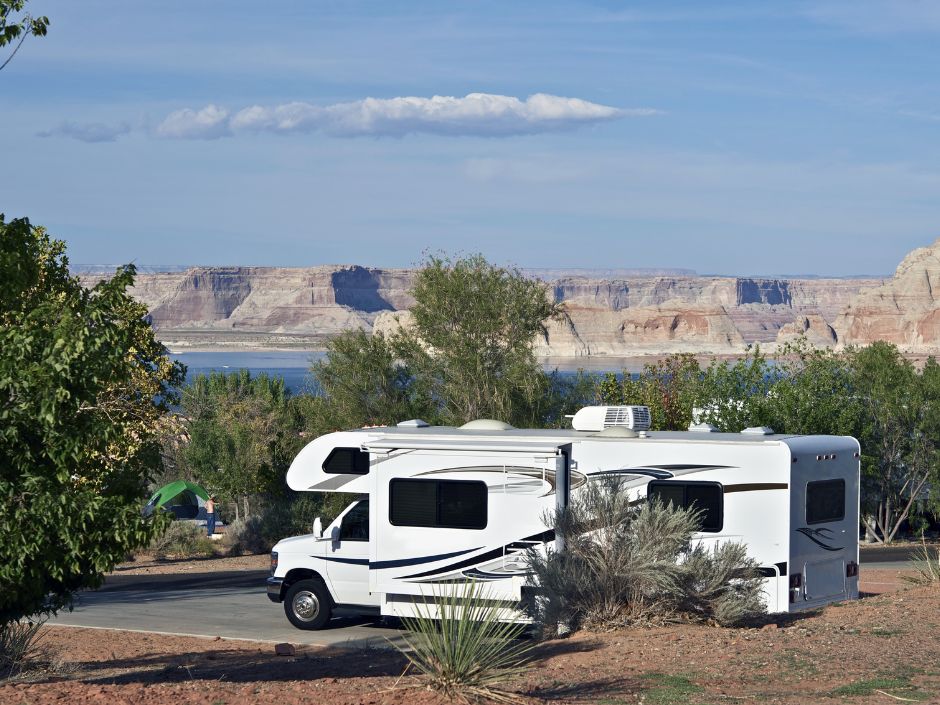There is a lot of preparation that goes into a road trip—it’s more than just picking fun excursions and restaurants to try in different places. From making sure you have proper medical and health care on the road to navigating different state laws while RVing, preparing for the safety of your RV and its passengers is just as important, if not more important, than the exciting parts of planning. Another important part of your trip is making sure you have insurance for your RV. Here’s how you can ensure that your RV has proper protection on your trip.
Typical Auto Insurance vs. RV Insurance
Typically, traditional auto insurance will not cover RVs unless they are being towed by an auto vehicle, such as a Jeep or truck. Therefore, RV insurance is required. Having RV insurance will provide financial protection if you are responsible for causing an accident and another driver gets injured or damage is caused. In addition, many RV insurance plans will offer endorsements, which are further protection options that you can choose based on personal preference.
Types of RV Insurance
From covering the cost of hospital visits due to an accident to basic repairs, such as fuel delivery, there are many different endorsements you can add to your RV insurance.
- Personal liability insurance: This is an important type of RV insurance to have since it applies to when you are the cause of an accident or damage, especially when repairs on other vehicles are needed or someone is injured.
- Collision insurance: If you collide with another vehicle, this type of RV insurance will cover the costs of an RV repair or replacement.
- Roadside assistance: If you don’t want to worry about the cost of small maintenance tasks and repairs, such as fixing a flat tire, then you can add roadside assistance to your RV insurance plan.
- Uninsured/underinsured motorist insurance: If the person who caused an accident with your RV cannot come up with the costs to cover injuries or damage, then this type of RV insurance will do that, making it an important one. In fact, it’s required in several states.
- Comprehensive insurance: Any type of damage that isn’t typical or is unexpected, such as fire damage or other accidents not caused on the road, will be covered by comprehensive insurance.
- Personal belongings coverage: If anything in your RV gets stolen or damaged, then the costs of replacing or fixing them will be covered.
- Vacation liability insurance: If you’re going on vacation, then this type of RV insurance will cover liability costs at places like campgrounds and RV parks.
- Medical payments coverage: Keep yourself healthy with this RV insurance that will cover the costs of medical expenses if such injuries were caused by an accident in your RV.
- Emergency expense coverage: If your RV breaks down in the middle of nowhere, then emergency expense coverage will take care of costs for hotels, transportation, and anything else related to the incident.
- Permanent attachments coverage: If you plan on installing permanent attachments to your RV, such as a porch, then this type of RV insurance will provide coverage for them.
How to Find the Right RV Insurance Plan
With so many different types of RV insurance plans and companies, you may feel a bit overwhelmed with which to choose. First off, you should determine which endorsements are most important to you. Then, get several quotes from different RV insurance plans to see which one best fits your budget. A few popular insurance companies you can look into are GEICO, Allstate, State Farm, Progressive, and Good Sam.
Depending on which type of coverage you prefer, the cost of your insurance can typically range anywhere from $125 to $3000 per month. Rates can be affected by your RV driving background, claim history, the type of RV you drive, RV usage, and much more. You can also check with each insurance plan to see if they offer any discounts.
By taking the time to do research on different RV insurance companies and plans, you can find a plan that best suits your RV and personal safety. We hope that this guide helped you understand how RV insurance plans work so you can plan correctly. With the right plan, you can travel with more peace of mind.
See you on the road!



Share:
The Best Beach Bars in Daytona Florida
Signs of Dehydration, Exhaustion, and Heat Stroke